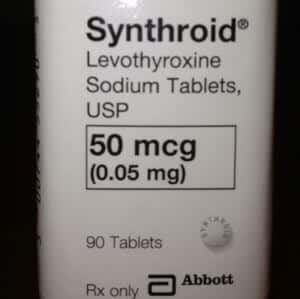
Overview
Thyroid hormones come in a variety of formulations and brand names. Synthroid is the most commonly prescribed of all the thyroid supplements. That is because the dose is more reliable than natural products made of dried thyroid glands.
Synthroid is long acting and comes in a wide variety of doses that allows for individualized treatment.
When people develop a sluggish thyroid gland they often feel tired and weak. They may become constipated, sensitive to cold or anemic. They may also suffer with dry skin and hair, thick brittle fingernails and have shortness of breath when they exercise. Some people report clumsiness, weight gain, or puffy eyes.
Thyroid problems are diagnosed with blood tests. The best is one that measures thyroid stimulating hormone, or TSH. This test also helps determine the proper dose of thyroid hormone for treatment.
Side Effects and Interactions
Side effects of thyroid replacement therapy are rare if the dose is appropriate. Specialists recommend beginning treatment with a low dose and gradually increasing it until symptoms of underactive thyroid disappear and the TSH blood test is normal. This may initially require blood tests every four to six weeks and good communication with the doctor.
Signs of overdose include insomnia, heart palpitations, jitteriness, rapid heart beat, increased sweating, higher blood pressure, changes in appetite, and reduced menstrual flow.
Other adverse reactions of excessive thyroid levels include tremor, headache, heart disease, diarrhea, and weight loss. Report any such symptoms to your physician promptly.
A number of medications may interact with Synthroid or alter the tests that detect thyroid problems. People taking estrogen, asthma medicines, decongestants (including those found in over-the-counter cold or flu remedies), antidepressants, certain cholesterol lowering drugs, blood thinners such as Coumadin or heart medicine like digoxin should check with a physician or pharmacist.
In theory, the herb guggul might counteract thyroid-suppressing drugs or increase the effect of thyroid hormones. Monitoring thyroid function is prudent. Licorice may alter the required dose of levothyroxine because of its impact on the thyroid gland.
Never stop taking Synthroid without first checking with your health care provider.
Special Precautions
Too much Synthroid can make a person more susceptible to osteoporosis or weakened bones. You may wish to discuss with your doctor whether you need tests to monitor bone density.
Thyroid replacement is usually needed for the rest of one’s life, and stopping the medicine suddenly could precipitate symptoms of inactive thyroid.
Don’t discontinue Synthroid without your doctor’s supervision.
Taking the Medicine
The usual recommendation is to take Synthroid before breakfast. Although this hormone is probably best taken on an empty stomach, it is more important to take it at the same time every day to maintain a constant level in your body.
Do not take this medication with iron pills, as they can interfere with proper absorption.

